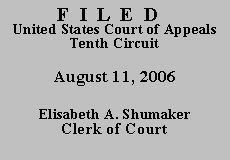

| UNITED STATES OF AMERICA, | No. 05-2260 & 05-2286
(Consolidated)
(D.C. No. 98-991) (D. N.M.) |
Roberts' presentence report calculated his guidelines range as 151 to 188 months based on an offense level of 29 and a criminal history category of VI. Based on Roberts' substantial assistance, the government moved for a downward departure under § 5K2.1. The district court granted the motion, reducing Roberts' offense level by four levels to 25, resulting in a sentencing range of 110 to 137 months. Roberts was sentenced to 112 months in prison and did not appeal his sentence.
While Roberts was awaiting trial, he informed jail officials of an escape attempt being made by fellow inmates. Based on this action, on April 9, 2001, he filed a motion to reconsider a downward departure under Federal Rule of Criminal Procedure 35(b), arguing that the sentencing magistrate was not aware of his efforts to assist prison officials. That motion was filed with a motion to correct his sentence under 28 U.S.C. § 2255. The § 2255 motion, which presented only a request for a lower sentence, was dismissed as procedurally defaulted because Roberts failed to appeal his sentence after conviction. The district court, however, did not address Roberts' Rule 35(b) motion. Four years later, the district court finally denied his Rule 35(b) motion because it was not filed by the government. Roberts timely filed a notice of appeal.
In this circuit, jurisdiction to hear appeals from the resolution of a Rule 35(b) motion arises under 18 U.S.C. § 3742. United States v. McMillan, 106 F.3d 322, 324 n.4 (10th Cir. 1997). Compare United States v. McAndrews, 12 F.3d 273, 277 (1st Cir. 1993) (holding jurisdiction is available under 18 U.S.C.
§ 1291). Section 3742 provides jurisdiction in only limited situations, none of which are applicable here.(1) There is no violation of law when a district court refuses to consider a defendant's Rule 35(b) motion, as that rule permits a district court to reduce a sentence after sentencing has been completed only "[u]pon the government's motion."
Roberts asks that we treat his Rule 35(b) motion as a motion to set aside his sentence under § 2255. We may construe Roberts' notice of appeal as an application for a certificate of appealability. United States v. Gordon, 173 F.3d 753, 753-54 (10th Cir. 1999). However, Roberts has not demonstrated a "substantial showing of the denial of a constitutional right." 28 U.S.C.
§ 2253(c)(2). Thus, if we were to construe his motion as a motion under § 2255, his "request" for COA would be denied. Furthermore, the record suggests that Roberts previously filed a § 2255 motion. While the record is unclear on this point, we cannot consider a successive habeas petition without a prior request authorizing such an appeal. See 28 U.S.C. § 2244(b)(3)(A).
Roberts also filed a "Motion for a Nunc Pro Tunc Recommendation to the Federal Bureau of Prisons Concerning the Defendant's Medical Care, Education, and Correctional Treatment." In that motion, Roberts asked the court to make a recommendation, under 18 U.S.C. § 3621(b), to the Bureau of Prisons that he should be placed in a community correctional center because of his medical needs. The district court denied the motion, stating that claims of inadequate medical care must be pursued under 42 U.S.C § 1983 or Bivens v. Six Unknown Named Agents of Federal Bureau of Narcotics, 403 U.S. 388 (1971).
We do not have jurisdiction to consider such a motion. If we construe this motion as a challenge to the sentence issued by the district court, the jurisdictional limitations in § 3742 bar consideration of the issue. If we construe the motion as a challenge to Roberts' conviction, his appeal is not timely. Even if we did have jurisdiction, Roberts' claim would fail. Section 3621(b) gives primary authority to the executive branch to determine the facility where a prisoner should be placed. Prows v. Federal Bureau of Prisons, 981 F.2d 466 (10th Cir. 1992).
Because we do not have jurisdiction to hear either of Roberts' claims, we DISMISS.
ENTERED FOR THE COURT
Carlos F. Lucero
Circuit Judge
*. The case is unanimously ordered submitted without oral argument pursuant to Fed. R. App. P. 34(a)(2) and 10th Cir. R. 34.1(G). This order and judgment is not binding precedent, except under the doctrines of law of the case, res judicata, and collateral estoppel. The court generally disfavors the citation of orders and judgments; nevertheless, an order and judgment may be cited under the terms and conditions of 10th Cir. R. 36.3.
1. Section 3742 provides jurisdiction when a sentence:
(1) was imposed in a violation of law;
(2) was imposed as a result of an incorrect application of the sentencing guidelines; or
(3)is greater than the sentence specified in the applicable guideline range to the extent that the sentence includes a greater fine or term of imprisonment, probation, or supervised release than the maximum established in the guideline range, or includes a more limiting condition of probation or supervised release under section 3563 (b)(6) or (b)(11) than the maximum established in the guideline range; or
(4) was imposed for an offense for which there is no sentencing guideline and is plainly unreasonable.